"A word of warning – don’t secure your next construction project at any cost" Contractors are continually pricing or bidding construction projects, hoping to secure their next project. Pricing new construction work takes lots of time and effort. Most often the contractor needs to have the lowest price, or certainly do enough to impress the client so that they win the project. Contractors could win one project out of ten projects they price. Sometimes the statistics are even worse. That's a lot of prices to submit. Unfortunately often contractors get desperate for their next construction project and desperate times can lead to contractors doing stupid things - like winning a project at a price less than it will cost them to do the work. Who want to build a project and lose money? Well of course nobody, yet unfortunately this scenario happens too frequently. Over the last 2 weeks I’ve discussed post-bid communications and meetings. These are communications and meetings the client has with the contractor to discuss the bid or price the contractor submitted for the client’s construction project. #constructionmanagement #constructionprojectmanagement #contractors What is the purpose of post-bid communications and meetingsSo you submitted your price for the construction project why would the client need to discuss your price or quotation? During these discussions the client may try to persuade contractors to: 1. reduce their price 2. accept changed scope or contract conditions at no extra cost 3. change conditions or exclusions the contractor included in their bid 4. shorten the project schedule Contractors must keep a cool head while negotiating new workIn the heat of the moment Unfortunately some contractors can become obsessed with being awarded a contract. They’ve gone through the process of preparing the price or quotation, and now the client is asking questions and calling them in for meetings. The negotiations are proceeding well and the contractor can almost smell the success of being awarded the project, but, the client is still requesting a reduction in the tender price or refusing to accept some of the contractor’s qualifications. In the heat of the moment it’s easy to give in to the client, provide a reduced price and accept a contract which excludes some, or all, of your qualifications. At times, this is done by senior management who don’t fully understand the project or their team’s concerns, only wanting to return to the office to say they’ve been awarded a new project thanks to their timely intervention. "some contractors are willing to concede almost anything during these price negotiations to be awarded the construction project. " I know some contractors are willing to concede almost anything during these price negotiations to be awarded the construction project. Sometimes, they even believe they’ll be able to find a way during the course of the project to get out of their commitments, or to recover the money they gave away. This often leads to projects that go wrong, lose money and give the contractor a bad reputation. Negotiating construction projects with the client"it’s important to do a reality check" What you can do The contractor needs to review their price submission to assess if the client’s requests can be accommodated. I’m not saying the quoted price is immovable, and nor am I saying the qualifications are cast in stone. However, it’s important to do a reality check, work out the minimum price and profit that makes the project worthwhile, and consider the cost and risk of removing the problematic qualifications. After all, I assume the original tender price and schedule was arrived at using logic and careful calculation, and the qualifications were inserted for a reason – why then should any of this change? Sometimes during these negotiations there may be more clarity or understanding of the perceived risks on the project. This understanding may result in the contractor downgrading the risk and possibly reducing the cost of construction. It may be possible to accommodate some of the client’s requests by coming up with innovative alternatives which could mean proposing alternative materials, different construction methods, earlier access dates to start the work, more equitable risk shearing or more attractive payment procedures. These may off-set the discounts offered or allow for an earlier completion date. This is all part of the negotiating process and it’s important to try and understand the client’s final position. Obviously if the contractor has a good relationship with one of the client’s team it’s often possible to gain inside information as to what the client’s real concerns are. Clients generally don’t like to hear the word ‘no’. But if the contractor can be partly accommodating, or provide reasons for why they can’t do something they can make the ‘no’ appear more palatable. Sometimes however contractors have to say ‘no’, as giving in to all of the client’s demands could make the project unprofitable, or result in the contractor not achieving what they have committed to deliver, which will impact their reputation. Do not make a mistake negotiating your next construction project"Don’t make rash unconsidered decisions" Sometimes clients pressurise contractors in a meeting to make an immediate decision about something which will affect the outcome of the negotiations. In this case, I suggest the contractor requests a break to confer with colleagues and work through the consequences of the decisions, or preferably, requests twenty-four hours to provide an answer. However, it’s important to respond as soon as possible otherwise the client may lose interest and approach another contractor. In some cases it’s necessary to go back to suppliers and subcontractors and ask them to re-assess their quotes to see how they can accommodate the client’s requests. Don’t make decisions on the assumption that your subcontractors and suppliers can adapt their prices to suit. Winning construction work without losing moneyWhatever happens with the negotiations, don’t make rushed and stupid decisions simply to be awarded the construction project – decisions which may be regretted later. Always ensure you have considered all the impacts agreeing to the client’s requests will have on the project, your company as well as your suppliers and subcontractors. Confirm all your answers in writing, ensuring they can’t be misinterpreted and that they refer back to your original bid submission. Also, ensure all copies of letters and calculations relating to these negotiations are placed in the project pricing file as well as any new information the client may have issued relating to their requests. #constructionmanagementtips #constructionprices #pricingconstructionprojects Other articles by the author In construction it’s important to know your clients – it could save you Should you submit a bid with a price less than the project will cost you? Improve cash flow – implement these strategies when pricing your next project. (Written by Paul Netscher the author of the acclaimed books ‘Successful Construction Project Management: The Practical Guide’ and ‘Building a Successful Construction Company: The Practical Guide’. Both books are available in paperback and e-book from Amazon and other retail outlets. This article is adapted from information included in these books.) © 2022 This article is not to be reproduced for commercial purposes without written permission from the author.
2 Comments
Construction bid clarification and negotiation meetings. Tips for winning your next project.25/7/2015 Before awarding a new construction project many clients request the contractor with the lowest price, or the lowest bidder, or maybe even the contractors with the 3 lowest project price or quotation, to attend a price or bid clarification meeting. If you are invited to a post bid (project price submission) meeting your actions in the meeting could mean the difference between winning and losing the construction project. Rash actions or concessions at the meeting could also cost the company dearly should you be awarded the project. #pricingconstructionprojects #constructionprojectpricing #contractors The purpose of post construction project price meetingsThe purpose of these meetings is often to: 1. Meet and assess the contractor’s team 2. Ensure the contractor has understood the project and has the necessary resources 3. Address any concerns regarding the contractor’s bid submission 4. Discuss changes in the scope of works that have occurred subsequent to the bid submission 5. Negotiate better prices or contract term "Be prepared for the project negotiation meeting" How contractors can prepare for project price negotiationsPreparing for the meeting Before the meeting the client will usually send out an agenda. If they haven't it might be prudent to request one so you can be better prepared for the meeting. In preparation for the meeting: 1. read through the agenda and ensure you’re prepared 2. go through the tender again to refresh yourself on the details (often you have moved onto other projects and have forgotten some of the details) 3. ensure that everyone attending the meeting is familiar with the project and can add value to the discussion (often senior managers or executives from the contractor attend, many of whom are unfamiliar with the tender and the project constraints, leading them to make inappropriate comments, promises and commitments – ensure they are fully briefed and understand the risks and constraints of the project) 4. ensure you know the date, time and place of the meeting, as well as the contact person and their details (it’s also useful to know the name of the meeting room since I’ve regularly arrived for a meeting at a large organisation and the receptionist has been unable to find the contact person because they are busy meeting with another contractor) 5. take a complete copy of the tender submission, filed correctly, including the calculations and the post-tender correspondence (there’s nothing worse than being asked a question in the meeting and having to page through file after file, looking for the relevant document) 6. take sufficient business cards, a note pad and pen The contractor's negotiating teamYour team The size and the make-up of the contractor’s team attending the meeting will depend on a number of factors: 1. the size of the project 2. the agenda provided by the client (for example, if there’s an item on quality it may be prudent for the proposed project Quality Advisor to attend, or, even perhaps the company’s Quality Manager) 3. who the client’s attendees are 4. what the client’s known priorities are (for instance, if safety is important take the company’s Safety Manager as well as the proposed project Safety Advisor) It’s useful to include the senior staff you propose to use on the project. Where possible include the person who prepared the bid and is familiar with the submission and calculations. Of course it goes without saying that everyone should be dressed neatly and arrive for the meeting on time. It’s often useful to arrive early as it may well provide an opportunity to see the other contractors being interviewed, or to meet some of the client’s team informally before the meeting which could provide some insight into their thoughts regarding the project and your tender submission. Case study: We arrived for a construction project clarification meeting to be told apologetically that we wouldn’t be starting on time as the previous contractor had arrived late for their meeting – not a good start for them! However, five minutes later the other contractor walked out of the meeting looking embarrassed and we were called in for our meeting almost on schedule. Sometime later when I met the other contractor at an industry event I asked why their meeting was so short and they told me they thought the meeting was for another project they had submitted a price for to the same client. They arrived with the pricing documentation for that construction price and were prepared to discuss that project, so when the client started asking questions their replies related to the wrong project. When the client couldn’t understand what they were referring to they eventually figured out the confusion. Obviously the client was less than amused and quickly terminated the meeting. Needless to say they weren’t awarded either of the projects. The project negotiation meeting"appear positive, and if what the client is asking isn’t possible explain why and offer alternative solutions" The meeting At the meeting: 1. introduce the team, explaining each person’s role on the project 2. ensure your team is led by one person who may delegate others in the team to answer particular questions 3. take notes at the meeting even if the client confirms they’ll be sending out formal minutes 4. take time to answer the client’s questions; if uncertain ask them if it’s possible to provide an answer later 5. listen carefully to the client’s concerns and try and address these during the meeting as well as in post-meeting correspondence 6. at the end of the meeting summarise the questions that require answers, by when they will be answered, and to whom the answer should be directed (ensure there’s sufficient time to get the answers to the client) 7. appear positive, and if what the client is asking isn’t possible explain why and offer alternative solutions 8. don’t make promises and commitments that cannot be kept 9. thank the client for inviting you to the meeting After project price clarrification meetingsAfter the meeting After the meeting on returning to the office: 1. allocate the questions to the relevant staff and then coordinate the answers into one reply to the client 2. when the minutes of the project price negotiation meeting are received check that they are correct and are a fair reflection of what was discussed and agreed at the meeting (if there is anything that you disagree with, address this in a formal letter to the client) 3. if necessary send a letter after the meeting confirming the discussions and any revisions to the tender offer made during the meeting 4. ensure the client’s questions are replied to within the agreed time 5. send a letter thanking the client for the opportunity to meet with them and offer to answer any further questions they may have "sell your company and price to the client" Winning your next construction projectThese meeting provide your company an opportunity to sell to the client why they are the best contractor to construct their project. Don’t spoil this opportunity by being unprepared or by taking the wrong people to the meeting. #winningconstructionprojects #pricingconstructionprojects #construction Next week I will discuss the negotiations further in: ‘A word of warning – don’t secure the project at any cost’ Construction project bid negotiations – Don’t make a mistake Similar articles by the author Post bid communications – the difference between winning and losing a bid How to improve cash flow on your project - part 2 How do construction companies keep a good client (Written by Paul Netscher the author of the acclaimed books ‘Successful Construction Project Management: The Practical Guide’ and ‘Building a Successful Construction Company: The Practical Guide’. Both books are available in paperback and e-book from Amazon and other retail outlets. This article is adapted from information included in these books.) © 2022 This article is not to be reproduced for commercial purposes without written permission from the author.
Subcontractors play an important part in the success of many construction projects. It’s important that subcontractors aren’t chosen purely on price. The subcontractor’s ability to deliver the project on time and to the required quality and safety standards is equally important. I’ve worked on construction projects where the selection of the cheapest subcontractor ended up costing the project more money than if a more expensive subcontractor had been selected. "Subcontractors are viewed by the client as an extension of the main contractor" Subcontractors are viewed by the client as an extension of the main contractor (general contractor) and a failure by the subcontractor can adversely affect your company’s reputation. "there is a lack of communication between the contractor and the subcontractor" Unfortunately some contractors don’t manage their subcontractors. They appoint them and then leave them to get on with the job. Often project staff aren’t briefed about what the subcontractor’s scope of work is. Time and again there is a lack of communication between the contractor and the subcontractor - particularly with those doing the work. When there are problems the subcontractor is blamed. Managing subcontractors"communication with the subcontractor of a contractual nature must be in writing" Some important points to note when managing subcontractors are to ensure: 1. the contractor’s person managing the subcontractor understands:
4. regular meetings are held with the subcontractor to discuss safety, quality and environmental matters, as well as progress on the project and any delays and claims, and that minutes of these meetings are distributed to the relevant parties 5. subcontractors acknowledge the receipt of drawings and information issued to them (or there’s proof they have received them) (I have had subcontractors claim they hadn’t received a particular drawing revision when they had) construction project drawings 6. where relevant, the subcontractor supplies shop drawings in accordance with the project schedule, including allowing for obtaining the required approvals from the contractor or the client 7. communication with the subcontractor of a contractual nature is in writing (any verbal instructions should be followed up in writing) 8. only the contractor’s delegated responsible staff communicate with the subcontractor (I have had subcontractors receive conflicting instructions from our staff resulting in confusion and errors) 9. action is taken as soon as it appears that the subcontractor could be in trouble (see my last article ‘Are your subcontractors profitable? Should you care?’) 10. the subcontractor is forewarned of the contractor’s intention to back-charge them for work or services supplied by the contractor and that these charges are invoiced regularly 11. the subcontractor is paid in accordance with the contract 12. the subcontractor has suitable quality, safety, environmental and industrial relations procedures in place that comply with the project requirements Why Safety Is Important On Your Construction Project 13. subcontractors don’t begin work until there’s a signed contract in place and they’ve supplied the required sureties and insurances 14. the subcontractor’s staff, equipment and their own subcontractors are approved by the contractor The Alarming Truth about Using Old Construction Equipment 15. the subcontractor’s personnel attend the contractor’s project induction Site or project inductions 16. correspondence from the subcontractor is promptly dealt with When subcontractors let the project downSometimes subcontractors do get into problems. It’s important to understand the reason for these problems which may be due to the main contractor’s poor management, delays, lack of communication or change of scope. However, it is also often due to the subcontractor’s poor management, lack of cash flow or incompetence. By understanding the problem you may be able to take action to rectify the problem or at least prevent it from getting worse. It is important to follow the contract and ensure the correct notifications are given. Withholding payment for poor performance without providing the appropriate notifications may result in the GC being in breach of contract. Subcontractors are an important part of the construction teamSubcontractors need to be managed by the main contractor (general contractor) to ensure that their performance meets the project’s safety and quality requirements, and that work is in accordance with the project’s schedule and specifications. Failure to manage subcontractors properly often leads to disputes, claims, project delays, substandard work and even accidents. This leads to project failure, often resulting in all parties losing money and the client getting their project late which negatively impacts the contractor’s reputation. #subcontractors #constructionmanagementtips #constructionprojects Other articles by the author: Are your subcontractors profitable? Should you care? Is the cheapest really the cheapest? The importance of planning your project. "A practical and really helpful guide to navigating the myriad of things to think about when managing a construction project. I found that referring to this book was like having my own mentor on tap. Excellent." (Reader Amazon)  (Written by Paul Netscher the author of the acclaimed books ‘Successful Construction Project Management: The Practical Guide’ and ‘Building a Successful Construction Company: The Practical Guide’. Both books are available in paperback and e-book from Amazon and other retail outlets. This article is adapted from information included in these books.) © 2022 This article is not to be reproduced for commercial purposes without written permission from the author.
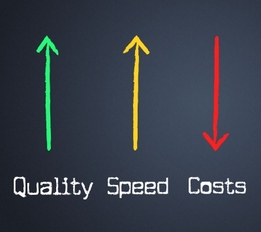 Image courtesy of Stuart Miles at FreeDigitalPhotos.ne Image courtesy of Stuart Miles at FreeDigitalPhotos.ne How to improve construction productivity. Many projects aren’t completed on time or exceed the original budgeted costs. Over the last few weeks I have written a number of articles on this subject. In this article by McKinsey & Company the authors highlight many of the same points as well as others that could help to make construction projects more successful. Read: The Construction Productivity Imperative Please add your comments. Similar articles by the author: How can clients ensure their projects meet their expectations? How designers can make construction projects more successful How can the owners project manager ensure the success of their construction project "Winning new construction work does not stop when the contractor submits their price" In our last articles we discussed how important it was for contractors to ensure that their construction prices or quotations were correct and presented in a professional manner to give the contractor the best chance of winning a new construction project. Steps to help you win your next construction project, and Your tender submission or quotation – Get it right But having a good price and a professional presentation is only part of the job and the contractor often has to do some more work to win the construction project. Often after receiving prices for their construction project (tenders, bids or quotations) clients/owners talk to some of the contractors who submitted a price. These discussions can impact whether the contractor wins or loses the project. But also, mistakes at this stage may cost the contractor dearly when they are awarded the project. These discussions may be in the form of written correspondence, or may involve formal meetings with the contractors. "there are several reasons clients want to talk to a contractor after reviewing their project price. And it's not always just to get a discount!" Why clients talk to contractors after receiving their quotationWhy are there discussions Usually the discussions are initiated because: 1. The client has queries about the contractor’s price and what’s included. 2. The client wants to ensure the contractor understands the project and has the resources and skills to do the project. 3. The client has made changes to the original project pricing documents or tender documents and requires contractors to revise their price. 4. The contractor has included conditions in their price which the client doesn’t want to accept "Just because the client is talking to you does not mean the project is in the bag!" The fact that the owner/client is talking to the contractor may indicate that they are interested in the contractor's price. However, in some cases they may be talking to all those who submitted a price - particularly if they have made changes that require contractors to update their price. Dealing with communications after your construction price is submittedYou should have included contact details in your tender of the person who the client should contact when they have questions. Obviously, ensure that person will be available to answer correspondence or at least provided secondary contact details. We often had to submit prices just before closing for the industry break. Clients however are usually in a hurry to get answers and don’t respect these breaks. Correspondence that goes unanswered will probably end any further interest in your price. "Answers may not be immediately available. Don't be rushed but keep the client informed" It is essential questions are handled and coordinated by one person in the contractor’s office. Failure to do this may result in the client receiving conflicting answers or perhaps not receiving any answers when there’s a mix-up between the contractor’s personnel. Often Clients expect an answer straight away, while the contractor may have to contact subcontractors and suppliers for answers and sometimes do extensive recalculations. You may have to ask for more time, or if the client won’t grant this, make sure that they understand this is an estimate, and then follow up when the correct information immediately it’s available. Guidelines for answering questions about your project price"Ensure the total contract price is revised to include all the agreed changes and additions" When the client asks questions relating to the price or quotation ensure answers: 1. address these questions 2. have taken into account all of the impacts, which may include changes to the schedule, increased costs, additional overheads, delayed access, extra mobilisation costs and impacts on the rest of the project (for example, even what appears to be a small change in specification could have a major impact on the schedule if an item has to now be imported) Mistakes that impact construction schedules/programmes 3. are provided on time 4. are unambiguous and clearly state what’s included and what’s excluded 5. take into account previous responses 6. are framed in a positive manner (It’s easy to say you can’t do something, but the client won’t be happy with the answer. If you really can’t, then offer alternative solutions or explain why it’s not possible.) 7. highlight reasons for some answers, where necessary 8. offer alternative solutions where the contractor is unable to comply with the client’s requests 9. provide a revised total price which includes the effects of previous answers (Not doing this got our company into trouble on one project as the client awarded the project on the total price in the last submitted answer, assuming this price included all of the previous adjustments and answers the company had provided. However this price only took into account some of these adjustments.) 10. are sent in a formal letter (if an answer is provided verbally in a meeting it should be followed by a letter) addressed to the client’s nominated representative 11. refer back to the original tender documents, terms and conditions, and exclusions and qualifications 12. are carefully thought through 13. are filed in the tender file, together with the supporting calculations and information, so that it’s possible at a later stage to understand how the revised tender sum was arrived at I had one project where we couldn’t find any calculations relating to how the original project was priced or how it had been reduced to the final price in the contract. They were obviously done on a scrap piece of paper and discarded. I might add that the difference was worth several million dollars and nobody could tell me how the new price was arrived at. Unfortunately, sometimes the questions are sent several weeks, or months, after quotations or tenders are submitted and the Estimator has moved on to pricing other construction projects. It’s important the Estimator takes time to analyse and answer the question, referring to, and reading the original quotation or price submission to refresh their memory. Failure to do so can result in costly errors. "Consult subcontractors when changes and additions to the project or contract conditions will impact them." It’s essential when subcontractors or suppliers could be affected by these questions that they are consulted to allow them to modify their prices if necessary. Nonetheless, they do need to understand this mustn’t be treated as an opportunity to add money to their quote without reason, making the contractor’s quoted price too expensive. The fact that the client is talking to the contractor should be kept confidential so the other contractors don’t hear of this. If they know the client is talking to you they may come up with a strategy to ensure they are viewed more favourably. Any subcontractors or suppliers involved in these questions should be cautioned to keep them confidential. Take care answering questions relating to your project price"a carelessly answered question could lose the construction project or cost the contractor later" Frequently contractors are rushed in replying to questions about their project price or quotation posed by the client. They may be distracted by other bids they are working on. This can lead to them misunderstanding the questions, perhaps making a mistake with their calculation, or not given the required attention to their reply. After all your efforts in preparing and submitting your project price you wouldn’t want to let the opportunity of winning the construction project slip through your fingers because of a carelessly answered question. But a carelessly answered question could also cost the company dearly later when the costs are higher than anticipated in the answer. #pricingconstructionprojects #constructionmanagement #constructionquotations In my next articles I'll consider post bid meetings and negotiations. Construction bid clarification and negotiation meetings, and Construction project bid negotiations – Don’t make a mistake For similar articles read: Steps to help you win your next construction project Don’t make a mistake when you price your next construction project Tender submission or quotation – Get it right © 2022 This article is not to be reproduced for commercial purposes without written permission from the author. (Written by Paul Netscher the author of the acclaimed books ‘Successful Construction Project Management: The Practical Guide’ and ‘Building a Successful Construction Company: The Practical Guide’. Both books are available in paperback and e-book from Amazon and other retail outlets. This article is adapted from information included in these books.
Many General Contractors (Main Contractors) probably aren’t concerned whether their subcontractors make or lose money on their construction project. Why should it impact them? It would after all seem to be an anomaly, because if a subcontractor is making money it’s probably at the project’s expense? But no! In fact some GC’s make a habit of squeezing their subcontractors so they can be more profitable. #subcontractors #constructionmanagement "Squeezing subcontractor so that your company makes more money is usually counter productive and often costs the project" Why it’s helpful when your subcontractor is profitableA subcontractor who is profitable is usually a happy subcontractor, and a happy subcontractor is:
But a subcontractor who loses money:
"Subcontractors that become bankrupt often create a major headache for the project" How you can assist your subcontractorsSo why do subcontractors lose money and how can you assist them to make money? Many smaller subcontractors aren’t astute as they should be, or don’t have the management skills and knowledge that they should. Some subcontractors are working on a number of projects at one time, trying to share their time and resources between their different projects and clients. They often don’t have the money for a large number of supervisors or project managers. Some General Contractors are happy to let their subcontractors bumble on, only taking action when there’s a major problem. I however, prefer managing my subcontractors and providing help and guidance when needed "Be fair to your subcontractors, this includes paying them on time and not impeding their work" How you can help your subcontractors?
When your subcontractor is in troubleHowever some subcontractors will never make money on a project, due to their incompetence, or a contract price that is too low. (Selecting subcontractors for your construction project) I certainly don’t advocate you pay them money which isn’t due to them. Still, it’s important the Project Manager is aware of problems a subcontractor may have, particularly if they are losing money on the project, and takes mitigating actions, for example:
Subcontractors are vital to the success of many construction projects"Successful construction projects are built by a harmonious team" Construction requires teamwork. Often subcontractors are vital to the success of a project. A delay or poor quality caused by a subcontractor usually impacts the project as a whole and negatively impacts the General Contractor’s reputation. Proper selection of subcontractors including correctly adjudicating their quotation will help minimise problems. Managing subcontractors properly is essential. #contractors #constructionmanagementtips #constructionsubcontractors
Other similar articles by the author Understanding what impacts your company’s reputation Did you make a difference on your project today? Choosing a subcontractor © 2022 This article is not to be reproduced for commercial purposes without written permission from the author.
"Winning new construction projects is often not just about having the lowest price." In a previous article Steps to help you win your next construction project we discussed what contractors should do to win more construction projects at the right price and for the right client. Winning new construction projects is often not just about having the lowest price. Don’t underestimate how important your project price submission (tender submission) is. This must be as professional as possible. In the past, I’ve often attended price clarification meetings where the client has complimented us on our quotation or price submission and they have possibly been swayed to award the project to us. Leaving out something from your price submission could mean that your price is disqualified or that your quotation is evaluated without the client have access to all the relevant information. Clients may have a number of submissions to evaluate and sometimes won't be bothered to read through all of your price submission to search for the required information that wasn't clearly available. #constructionpricing #pricingconstructionprojects #constructionindustry What construction price submissions should contain"Include what the client requested and sell your company as being the best contractor for the project" Some or all of the following could be included in the tender submission: 1. an index for bulky submissions so content can easily be found 2. covering letter 3. the final price or form of tender 4. commercial and technical clarifications and qualifications 5. the proposed construction schedule (programme) or project duration 6. a break-down of the price 7. the contractor’s proposed project management organisation chart and curriculum vitae of senior staff 8. a list of equipment and subcontractors 9. the deliverables the client has requested (which may include proof of insurances, cash flow and histograms) 10. company profile including a list of similar projects the contractor has completed 11. safety information and documentation 12. quality documentation (keep the information relevant to the project and demonstrate the company has a clear understanding of the client’s requirements and will meet and even exceed these) 13. environmental management information and documentation 14. if necessary, traffic management plans 15. the project approach, work methodologies and considerations taken into account in the tender 16. company brochures (which may include financial statements and safety statistics) "You should demonstrate to the client that your company understands the construction project and has the capabilities to complete it" Include as much information as possible to demonstrate that the company has an understanding of the construction project, has thought through the construction process, and has the personnel and resources to undertake the project successfully. Ensure sections such as safety and quality are included in their own separate sections in the submission and aren’t spread across other areas of the submission. This could result in the reviewer only receiving, and reviewing, a portion of the relevant information. Remember, large and complex construction price submissions are often reviewed by a number of different people, or departments, within the client’s organisation. The quotation or tender submission is frequently split into the relevant sections which are then circulated to various people who aren’t even directly associated with the project but will, for instance, be requested to review all the contractors’ safety documentation. If they don’t receive the full submission from a contractor they’ll assume it wasn’t included and will give the bidding contractor a poor rating which may adversely affect the contractor’s chances of being awarded the construction project. Scoring your project priceMany construction project price submissions are scored not just on price but are affected by other items in the submission such as quality documentation, safety plans, methodology and schedule. Often the client has a defined method they will use to score and adjudicate the contractors' quotations, which could take into account a number of factors including the price. This process often follows a set formula which is outlined in the project pricing document. The contractor must understand how this formula works, ensuring they maximise their scores. The items the client will look at should be clearly highlighted and must comply with the client’s requirements. For instance, some clients may score the contractor’s price as 90% of the overall score with the remaining 10%, say, being made up of various factors, such as the local ownership of the company, the number of indigenous employees, the amount of money that will be spent in the local community, the experience of the proposed construction team, the resources available for the project and the contractor’s safety record. "Don't leave something out of your price submission which could jeopardise your chance of winning the project" Checking your project priceCheck the price submission to make certain: 1. all the documentation requested by the client has been completed and is included 2. that all the pages have been printed and are included (sometimes in the binding process pages get inadvertently left out, or during printing, errors occur resulting in blank pages) 3. the pricing documentation or quotation is presented in a logical and easy to read format (The specific documents the client has requested should be highlighted and easy to find. I’ve on occasion had clients ask for documentation which we had included in our price submission but which they couldn’t find. This is frustrating for the person adjudicating the price or quotation and can lead to them assuming it isn’t available, resulting in your price for the construction project being disqualified.) "Demonstrate that you are the best contractor for the construction project" Do not jeopardise your chance of winning the next construction projectIt would be a pity if you weren’t awarded a project, despite all the work you put into pricing it, because your presentation was shoddy, the client couldn’t find a required document, or weren’t convinced you were the best construction company to construct their facility. #constructionmanagement #constructionmanagementtips #constructionquotations In our following articles we delve into more ways to improve your chances of winning your next construction project. See Post bid communications - the difference between winning and losing a bid., and Construction bid clarification and negotiation meetings, and Construction project bid negotiations – Don’t make a mistake
(Written by Paul Netscher the author of the acclaimed books ‘Successful Construction Project Management: The Practical Guide’ and ‘Building a Successful Construction Company: The Practical Guide’. Both books are available in paperback and e-book from Amazon and other retail outlets. This article is adapted from information included in these books.) Other similar articles by the author: Improve cash flow. Implement these strategies when pricing your next project Don’t make a mistake when you price your next construction project Why owners sometimes appoint the wrong contractor © 2022 This article is not to be reproduced for commercial purposes without written permission from the author.
Are you pricing numerous construction projects and not winning any work? Why aren’t you winning projects? You probably think it’s because your price is too high? But maybe there are other problems. Last week I discussed the importance of ensuring your price was correct. Read; ‘Don’t make a mistake when you price your next construction project’. In this article I’ll discuss how you can make your bids/tenders/quotations more successful, so you can win more work. #pricingconstructionprojects #constructionprojectprices #contractors "Sometimes the contractor's quotation ends in the clients bin. What a waste!" Ensure your construction quotation is not disqualifiedOften prices/tenders end up in the client’s rubbish bin because they’re disqualified. All that hard work and your price didn’t even make the starting line. Reasons for this may be: 1. The project price arrived late which could be because it was submitted late or it went to the wrong person or the wrong address. 2. Your price or quotation wasn’t in the format requested. 3. Your company doesn’t meet the client’s criteria to build the project. This may be because you don’t have the correct registrations, aren’t large enough or don’t have the required financial strength or insurances. 4. You failed to submit all of the documentation that the client requested in their bid documentation. These may include; copies of insurances, surety bonds, financial statements, safety records, quality plans, etc. 5. Your project price submission didn’t comply with the client’s requirements such as; you haven’t priced everything requested in the document, didn’t comply with stipulated requirements or comply with the required methods of construction. Carefully read the project pricing document and instructions so that you can ensure your tender will not be disqualified. Submit a competative price for the construction projectWell this sounds really obvious and yet many companies don’t get it right. 1. Sometimes your price is just never going to be competitive because you are pricing against companies who can do the particular work better and more cheaply than you, or are better located to provide a cheaper price than you can. Understand your opposition and your shortcomings. If you know you are unlikely to be competitive don’t waste your time and possibly embarrass yourself with the client when your price is far higher than others. If you were invited to price the project, politely decline the tender. 2. Make sure you obtain competitive quotations from suppliers and subcontractors. 3. Understand the risks. Unfortunately you cannot price all the risks. Some contractors see ghosts around every corner and want to price for everything that could possibly go wrong. Unfortunately you can’t because you will never win a project. You will probably have to accept some risk. the 10 biggest construction risks facing contractors. 4. If you aren’t sure of something rather ask questions during the tender period, or qualify what you have priced. Don’t assume the worst case scenario and then price it. You can be sure your opposition probably won’t. Construction Project Pricing: Facts, Estimates, and Contingencies 5. Understanding who your opposition will be may also influence the level of profit you add to your price. If you know some are desperate for work you can be sure they will submit a keen price. We often had a good feel for how our opposition would price different projects and which ones they would be less interested in. Why should the client have you construct their project?Provide compelling reasons for the client to use your company Although some clients select contractors on price alone there are many who are more astute and can be selective. They understand the importance of selecting a contractor who is capable of delivering a quality project, on time, without accidents and with minimal risk to them or the project. Some things you could consider adding to your tender: 1. Address any concerns that the owner/client has raised in their documentation or at pretender meetings. 2. Highlight why your company will be the best contractor to construct the project. 3. Demonstrate that you have the resources to do the work. It’s useful to include your proposed project management organisation chart as well as the profiles of senior members of the project team. 4. Show you have an understanding of the project. A tender schedule included with your submission is useful in this regard as is a brief method statement or overview of how you will carry out the work. Try and differentiate your company from the other construction companies Use innovation to win the construction project"Think out of the box – how can you make your price cheaper (without sacrificing profit)" Sometimes it’s possible to improve your price even further by: 1. Offering a discount for early payment or if the client withholds less retention money or releases it sooner. 2. If the client has brought out a number of packages of work, it may be beneficial to offer a discount should your company be awarded more than one package of work. 3. Offering alternate materials which may be cheaper. 4. Offering alternative construction solutions which may be cheaper. Often construction pricing documents require you to price the original documentation and specifications and these alternatives may have to be offered separately. #constructionmanagementtips Winning more construction projectsI have won many construction projects despite not having the cheapest price. Often this has been due to the strength of our price submission or quotation which resulted in our client electing to pay a premium to engage our construction company knowing that ultimately their construction project would benefit from our expertise. Next week I will discuss your construction project price submission, how important it is and what you should include. Your tender submission or quotation – Get it right We then discuss Post bid communications - the difference between winning and losing a bid. and Construction bid clarification and negotiation meetings  Of course if you don’t want to wait until next week for the next article you can order my book ‘Building a Successful Construction Company: The Practical Guide’, which contains more valuable information to help you win more construction projects at the right price. "If you decide to know the main priniciples of construction projects and companies this book is for you. Inside it you will find many practical experience of the author." (Reader on Amazon) Other useful articles by the author: The importance of maximising your monthly valuations Should contractors price every project? (Written by Paul Netscher the author of the acclaimed books ‘Successful Construction Project Management: The Practical Guide’ and ‘Building a Successful Construction Company: The Practical Guide’. Both books are available in paperback and e-book from Amazon and other retail outlets. This article is adapted from information included in these books.) © 2022 This article is not to be reproduced for commercial purposes without written permission from the author.
Sometimes construction projects end in disputes between the General Contractor and the client or owner. Also, regularly disputes occur between the General Contractor (Main Contractor) and their Subcontractors or Suppliers. These disputes can end in legal action, result in media attention and even disrupt the project - sometimes bringing it to a halt. Usually it’s only lawyers that benefit from these disputes. Yet, somehow disputes are becoming more frequent on construction projects, almost becoming a way of business for some. #constructiondisputes #constructionlaw #constructionprojectmanagement Why construction disputes should be avoidedWhere possible construction disputes should be avoided because they:
How to avoid construction disputesGenerally most construction disputes can be avoided if appropriate actions are taken, such as ensuring:
Sometimes a dispute is unavoidable, but I’ve generally found that most construction variations and claims can be amicably settled without going down the dispute resolution or legal process. When construction disputes are unavoidableUnfortunately construction disputes which cannot be resolved do arise, and then it’s important to follow the dispute resolution process stipulated in the construction contract. Only as a last resort should you proceed down the legal route. Having said this, though, do not hesitate to ask for a legal opinion or for expert advice. Of course also ensure that senior management is aware of the problems and the next steps being considered. Just because there is a dispute doesn’t mean you can walk off the construction project. Sometimes construction companies do this, but it could be a fatal mistake if the proper termination procedures haven’t been followed, and may allow the client to take action against the contractor for breach of contract. #constructioncontracts ConclusionContractors need to be contractually astute. They need to understand the terms and conditions of the construction contract when they price the project, ensuring they are acceptable. These terms and conditions should be checked before the contract is signed. Project Managers need to understand their contracts and ensure they administer the project in terms of the conditions. By being proactive and knowledgeable most disputes can be avoided. For other similar articles read: 15 Questions to ask before starting your next construction project Are you working for free on your construction project Will your next construction claim be successful? Do you want to learn how to manage construction projects successfullyPaul Netscher has written several easy to read books for owners, contractors, construction managers, construction supervisors and foremen. They cover all aspects of construction management and are filled with tips and insights.
Visit to read more. The books are available in paper and ebook from most online stores including Amazon. © 2020 This article is not to be reproduced for commercial purposes without written permission from the author. |
Archives
June 2024
Note: We welcome genuine comments, especially comments that add additional information to the subject matter in the article. We however reserve the right to remove inappropriate comments, which includes comments that have nothing to do with the subject, comments that include inappropriate language, and comments that are an advertisement for a product or company, or which include an advertising link. Comments must be in English. We will not enter into discussion on why a particular comment was removed.
CategoriesCopyright 2016 - The attached articles cannot be reproduced for commercial purposes without the consent of the author.
The opinions expressed in the attached articles are those of the writer. It should be noted that projects are varied and different laws and restrictions apply which depend on the location of the contractor and the project. It's important that the reader uses the supplied information taking cognisance of their particular circumstances. The writer assumes no responsibility or liability for any loss of any kind arising from the reader using the information or advice contained herein. "I have what I consider some of the best books on construction management."
Books are available from: Amazon.com Amazon.co.uk takealot.com kalahari.com Amazon.in Amazon.de Amazon.fr Amazon.it Amazon.com.au Powell's Fishpond uread bokus Amazon.ca Amazon.es Other retail stores Available in paperback or on Kindle "28 YEARS OF CONSTRUCTION PROJECT MANAGEMENT EXPERIENCE, DEVELOPING SUCCESSFUL CONSTRUCTION PROJECT MANAGERS AND BUILDING SUCCESSFUL CONSTRUCTION COMPANIES"
|

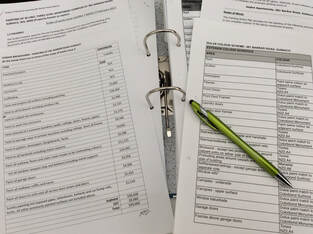


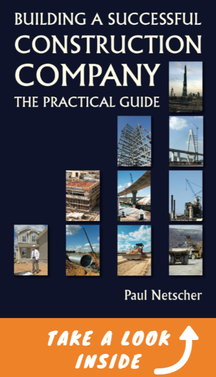

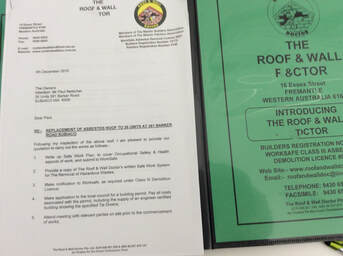

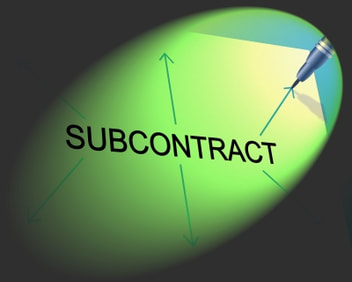
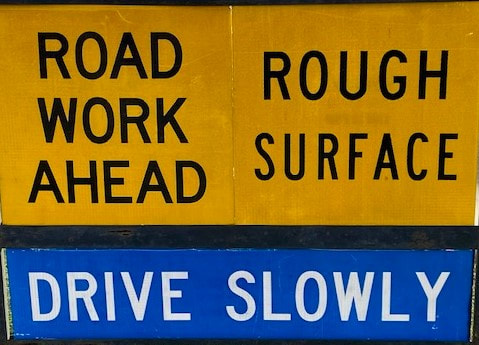


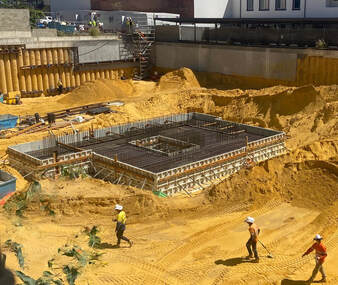
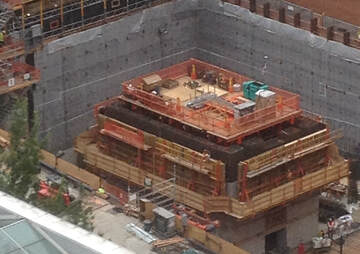



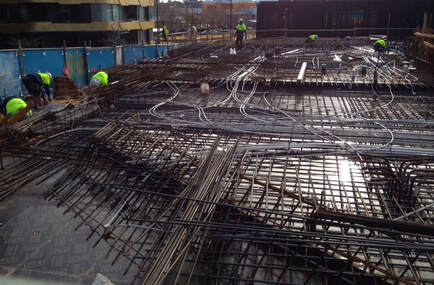
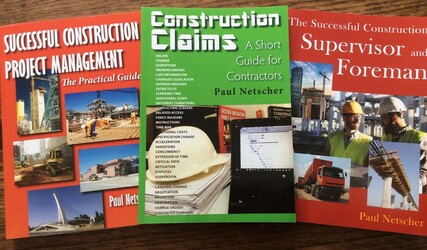


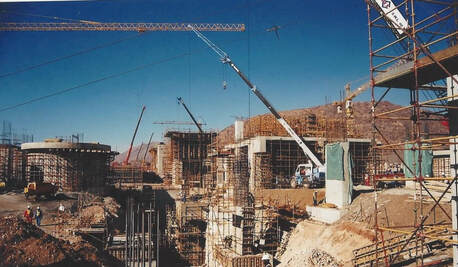
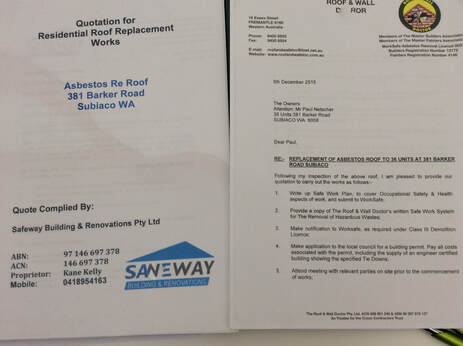




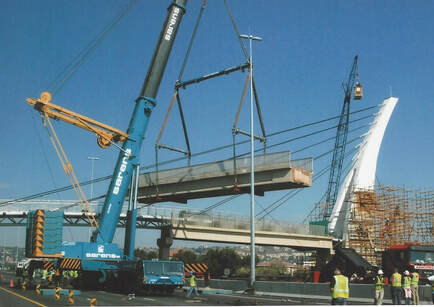
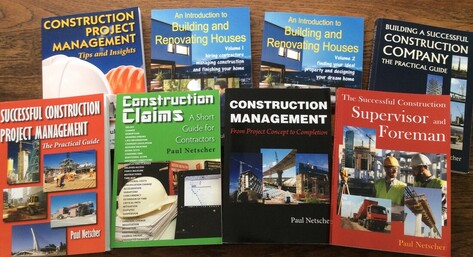

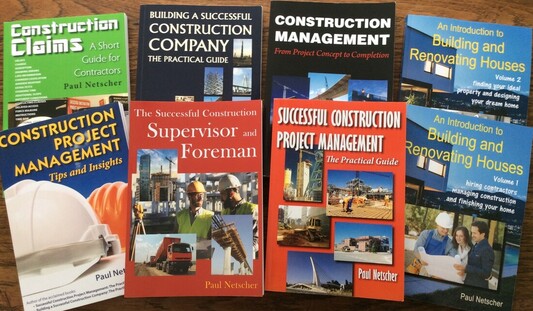


 RSS Feed
RSS Feed




